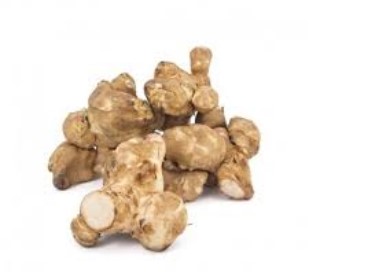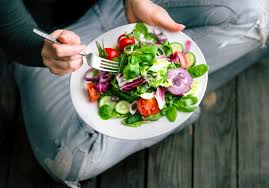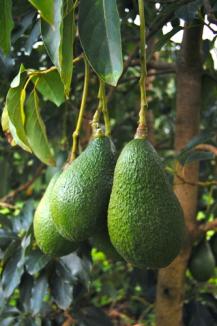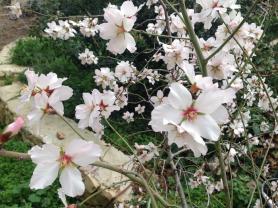Is it ginger? A twisted potato? It’s a Jerusalem artichoke!
Out of all the bulbs with misleading names, the Jerusalem artichoke probably wins “The Most Confusing Name” contest.
This is due to the fact that it is in no way related to the artichoke, and its origin has nothing to do with the Holy City. Just to make the case more interesting, it is actually a bulb of a sunflower.
Technically (and botanically) it is of course a perennial herbaceous plant from the compositae family, but nothing in this dry description implies that it is actually a bulbous root with a delicate and special flavor, somewhat light and nutty, slightly reminiscent of artichoke (I would say something like a combination of 70% artichoke, 20% potato, probably because of the texture, and another 10% of something nutty, maybe chestnut or even truffle. Sounds delicious?).
It is very common in North Africa and is very popular with Moroccan cuisine, through which it also reached the country.
The Jerusalem artichoke, or the “batatacasbiya” as called by the Moroccan Jews (or “tartufa” as called by Egyptian Jews, or “dolman”as called by Turkish Jews) was grown by the native Americans, aka Indians, before the white man came and ruined it all.
The bulb contains a lot of water (78%!) as well as carbohydrates, vitamin A, vitamin C, B vitamins, iron, calcium, magnesium, phosphorus, lots of potassium, and of course some fiber.
Because the Jerusalem artichoke stores inulin rather than starch, it has a low glycemic value, relative to the potato.
But, there is one small warning for all those with a sensitive stomach, and for those who are less experienced in eating Jerusalem artichokes, a sudden large amount might cause… some gas. Apparently, it is recommended to gradually increase the consumption if you wish to prevent this gas.
The Jerusalem artichoke season is short, and there are so many things that can be done with it in the kitchen.
If you too have chosen a fresh plump bulb for yourself, brought it home and left on the counter in the kitchen until you decide what is best to prepare with it, there are numerous options.
First, decide whether you want to eat raw food (otherwise known as salad) or cooked (winter is here, it is nice to eat something warm). In the salad department, Jerusalem artichoke goes well with green and sour apples, both wrapped in a sauce based on vinegar and honey (1 ½ tablespoons of honey with 4 tablespoons of red wine vinegar and a 1/3 cup of olive oil.
Mix well and pour over 2 large apples and ½ kg of sliced artichoke cut into juliennes, or passed through a food processor to obtain thin hairs).
Do you prefer your Jerusalem artichoke cooked? Fine. For starters you can make a very simple recipe called “Artichoke confit” – peel, cut and cook in a pot with olive oil (you can also add boiling water) until the artichoke is soft.
Mash into a spread and season (salt can be enough, chili gives the flavor an interesting twist) and you have a delicious and interesting spread for bread. Do you prefer your Jerusalem artichoke hot on a plate?
Fine again. Another option for a hot addition is to make a Jerusalem artichoke stew with coconut milk: fry a clove of chopped garlic in a pan with some butter (or oil), add the peeled and chopped Jerusalem artichokes.
Cook for a few minutes and then pour in a can of coconut milk. Season with salt and pepper. If you happen to have at home, saffron is a delightful addition too.
Bon appetite!
Yours.
The Garden’s team
Forecast:
In the ORGANIC vegetable baskets we expect (draft only):
Cucumber
Kohlrabi
Lettuce
Potato
Carrot
Onion
Swiss Chard
Beet
Parsley
The Large organic vegetable baskets also include:
Sweet potatoe
Spinach
Coriander
In the ORGANIC fruit baskets (NEW – Increased variety, price – 70 Shekels)
Oranges
Grapefruit
Banana
Clementine
Pomelo
The large ORGANIC fruit baskets also include: ( NEW – Increased variety, price -100 Shekels)
Lemon
Papaya
Pomegranate
The ORGANIC Green Basket:
Swiis Chard
A kind of lettuce
Kale
Dill
Green onion
Sprouts
Spinach
NEW – The ORGANIC Basket for couples (price – 150 shekels):
Cucumber
Tomato
Lettuce
Potato
Eggplant
Carrot
Kohlrabi
Parsley
Swiss Chard
Beet
Sweet potatoe
Coriander
Beet
Oranges
Lemon
Sweetie











